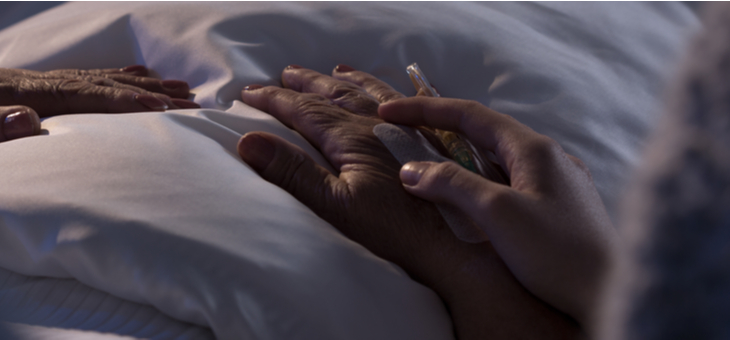Today is the first anniversary of voluntary assisted dying (VAD) in Victoria.
The official number of Victorians who have used the legislation is not yet available. However Justice Betty King QC, chairperson of the Voluntary Assisted Dying Review Board, said more than 50 people had used the legislation in the first six months and in each subsequent month, numbers had increased.
The board is due to report the total number to parliament in August.
Nearly 400 Victorians had registered in the first 12 months and 370 doctors have trained or are undertaking training in the state.
Justice King said on the ABC’s Conversation Hour she that, except for two major impediment, she was happy with how the process was working. One impediment was the limited number of trained doctors and the second being the commonwealth legislation that prevents telehealth being utilised as a means of assessment.
Telehealth was introduced during the COVID-19 lockdown.
She said: “Telehealth would make an enormous difference for people in regional areas. The people who are applying for these permits are very sick people and to ask them to come to Melbourne to see a specialist is often a real imposition.
“But the requirement is for face-to-face consultations and this can’t be done via telehealth.”
Justice King strongly urged a review of the telehealth regulation but said that could only be done at the commonwealth level.
She said feedback was being sought from participating doctors and would be reviewed, but that process had only recently started.
“Getting feedback is very new,” she said.
“If we can streamline the process so that it is less stressful for the patient and for the doctor, we’d be happy to review that.”
Writing for crikey.com.au, Dr Nick Carr, a GP and an ambassador for Dying with Dignity Victoria, was critical of several aspects of the legislation.
“First, doctors are not allowed to tell patients of the option of VAD,” he said.
“No problem for the informed, or articulate English speakers who know that they have to ask, but a significant potential barrier for the more marginalised.”
He queried how his patients could give informed consent if he was not permitted to tell them about all their legal choices.
“It’s like being told that I can tell someone with heart disease about pills, but not about stents or surgery,” he said.
“Someone has to provide a written prognosis. Sounds simple, but many specialists have turned out to be uncomfortable about committing themselves on paper. And the honest answer is we don’t know who’s got five months to go and who has eight.
“But five qualifies and eight doesn’t.”
He said the process was cumbersome and time consuming, often taking three to four weeks to complete. Several of his patients had died before the process could be completed. For some, their deaths were okay, he said, but others had died alone or in distress. That could have been avoided if they had access to VAD.
Dr Carr said he had worked with 15 people over the first 12 months.
“Overwhelmingly, people have asked for the option of VAD to regain some control and choice; to not have to wait for a possibly unpleasant event to finally kill them; to not have to suffer the indignities of further losses of bodily function but to go quietly and comfortably at a time and with people of their choosing.
“For many people, just having the option has been an immense relief, even if they never went on to use it.”
He said there had been no suggestion of coercion at any point, but rather the opposite, and families had been more likely to be reluctant but supportive.
He described his VAD consultations as surprisingly uplifting.
“All the complex stuff about a horrible diagnosis, treatment failure and imminent death has already been done. By the time they come to someone like me for VAD care, it’s about the practicalities and getting things sorted out.”
He praised the statewide VAD navigators, tasked with helping people find their way through the system, as an invaluable resource for public and professionals alike. They had “done a superb job at holding the hands (metaphorically and actually) of patients, relatives and hapless doctors like me,” he said.
Oncologist Dr Cameron McLaren is another who says the cases he has been involved in have been “overwhelmingly positive”, adding that he had seen an enormous shift in his patients’ anxiety levels.
“The partner of one patient told me, ‘He perked up so much. He feels he’s being listened to and respected. He has hope he won’t be forced to live through something he doesn’t want’.
“It’s a great relief to people who are facing the great unknown. Not knowing how you will die is very frightening. Now people have the comfort of knowing they can have some control.”
The law in Western Australia will come into effect mid next year, and there have been some developments in other states.
Assisted dying for the terminally ill in Queensland will not be legislated before the state heads to the polls on 31 October.
Queensland Premier Annastacia Palaszczuk has asked for draft legislation backed by the committee to be sent to the Law Reform Commission for review.
VAD remains illegal in Tasmania, where euthanasia laws have failed to pass Parliament three times, most recently in 2017.
Does voluntary assisted dying give you peace of mind if you or a loved one ever had to use it? Or do you believe it leaves vulnerable people open to abuse?
If you enjoy our content, don’t keep it to yourself. Share our free eNews with your friends and encourage them to sign up.
Related articles:
https://www.yourlifechoices.com.au/news/how-will-assisted-dying-work
https://www.yourlifechoices.com.au/health/your-health/poor-sleep-linked-to-heart-disease
https://www.yourlifechoices.com.au/health/your-health/are-your-medications-killing-you

